Esemplarità e imitazione. Gloria e vergogna nell’Etica di Spinoza
Titolo Rivista RIVISTA DI STORIA DELLA FILOSOFIA
Autori/Curatori Francesco Toto
Anno di pubblicazione 2016 Fascicolo 2016/2
Lingua Italiano Numero pagine 22 P. 221-242 Dimensione file 651 KB
DOI 10.3280/SF2016-002003
Il DOI è il codice a barre della proprietà intellettuale: per saperne di più
clicca qui
Qui sotto puoi vedere in anteprima la prima pagina di questo articolo.
Se questo articolo ti interessa, lo puoi acquistare (e scaricare in formato pdf) seguendo le facili indicazioni per acquistare il download credit. Acquista Download Credits per scaricare questo Articolo in formato PDF

FrancoAngeli è membro della Publishers International Linking Association, Inc (PILA), associazione indipendente e non profit per facilitare (attraverso i servizi tecnologici implementati da CrossRef.org) l’accesso degli studiosi ai contenuti digitali nelle pubblicazioni professionali e scientifiche.
In this article, the Author focuses on Spinoza’s Ethics in order to expound the connection between the themes of "exemplar humanae naturae", "imitatio affectuum", and a number of passions related to what we would today call "recognition". What emerges is the value of this connection in relation to the transition from imagination to reason, from passion to virtue, from conflict to cooperation. First, the article highlights the partial break that imitation introduces with respect to the affects connected to self-preservation; the decentralization to which this imitation forces an otherwise self-centered subject; the need for reciprocity and justice of which imitation is the bearer; and the possible transition to an ethical approach that it tends to promote. Secondly, it reflects upon the difficulties connected to the mimetic dynamic’s combination with other dispositions and with the struggle for recognition. Finally, it refers to a possible solution to these difficulties, provided by the role of education and habits in the construction of recognition criteria that can be at the same time imaginary and potentially shared.
Parole chiave:Spinoza, passions, sociability, imitation, model, glory, recognition
- Superbia,existimatio, anddespectus: an aspect of Spinoza’s theory of esteem Francesco Toto, in Intellectual History Review /2022 pp.113
DOI: 10.1080/17496977.2021.2001885
Francesco Toto, Esemplarità e imitazione. Gloria e vergogna nell’Etica di Spinoza in "RIVISTA DI STORIA DELLA FILOSOFIA" 2/2016, pp 221-242, DOI: 10.3280/SF2016-002003